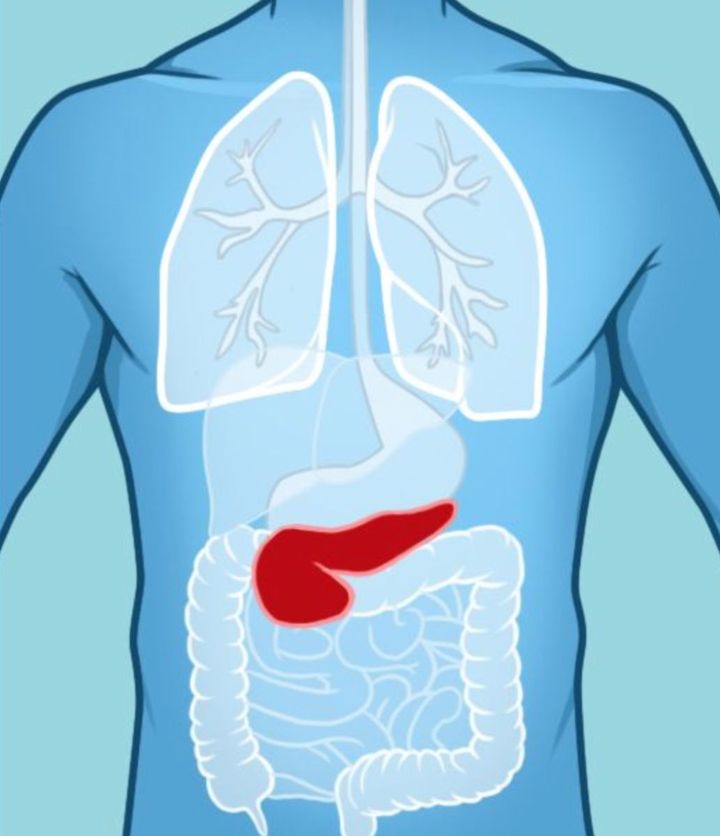The pancreas, though often overlooked, plays a vital role in our overall health. Tucked deep within the abdomen, this gland helps regulate blood sugar, breaks down fats, and aids in the absorption of essential nutrients. When it’s not functioning properly, however, it can lead to a variety of health issues, from digestive discomfort to serious diseases like diabetes and even pancreatic cancer. In this article, we’ll explore the signs of pancreatic problems and share some natural remedies that can support pancreatic health.
Understanding the Role of the Pancreas

The pancreas serves both digestive and endocrine functions, making it a critical part of the body’s metabolism and digestion. This small organ produces enzymes that break down fats, proteins, and carbohydrates and hormones like insulin that regulate blood sugar. A malfunctioning pancreas can therefore disrupt digestion and contribute to diabetes and other serious health issues.
Signs of Pancreatic Problems
Recognizing the signs of pancreatic issues early can help you seek timely medical attention. Here are some common symptoms that could indicate a problem with your pancreas:
1. Persistent Abdominal Pain
Pancreatic pain often begins in the middle of the abdomen and may radiate to the back. This type of pain can vary depending on the specific pancreatic condition:
- Acute Pancreatitis: Sharp, sudden pain that intensifies after eating may indicate inflammation of the pancreas, also known as acute pancreatitis.
- Pancreatic Cancer: Dull, persistent pain that gradually worsens over weeks could signal pancreatic cancer. If you experience any unusual or prolonged abdominal pain, it’s essential to consult with a healthcare provider.
2. Nausea After Eating Fatty Foods
If you feel queasy or nauseous after eating foods rich in fats—like burgers, pizza, or avocados—it might suggest that your pancreas is struggling to break down fat. This can lead to a buildup of undigested fats, causing discomfort and nausea.
3. Unexplained Weight Loss
Sudden, unexplained weight loss might seem like a welcome surprise, but if it’s paired with digestive discomfort or radiating pain, it may be a sign of a pancreatic issue. This could indicate that your body isn’t absorbing nutrients properly due to enzyme insufficiency.
4. Onset of Diabetes
A new diagnosis of type 2 diabetes, especially if you maintain a healthy diet and weight, may be a warning sign of pancreatic problems. The pancreas produces insulin, so difficulty managing diabetes could be linked to pancreatic dysfunction. If your diabetes becomes challenging to control, it’s wise to discuss the possibility of pancreatic involvement with your doctor.
5. Floating, Light-Colored Stools
Changes in stool color or consistency can reveal a lot about your health. Floating or light-colored stools are often a sign that the body isn’t absorbing fats effectively, indicating pancreatic enzyme insufficiency. This condition can result in greasy, foul-smelling stools due to undigested fats.
Home Remedies to Support Pancreatic Health

While medical attention is essential for diagnosing and treating serious pancreatic conditions, some natural remedies may help support a healthy pancreas. Here are a few home remedies you can try to support your pancreatic function:
1. Incorporate Lightly Steamed Vegetables
A plant-based diet, particularly one rich in lightly steamed vegetables, can help promote pancreatic health. Steaming vegetables preserves their nutritional content while making them easier on the digestive system. Vegetables like broccoli, spinach, kale, and carrots provide antioxidants and fiber, which are beneficial for both digestion and overall health.
2. Use Hydrotherapy for Pancreatitis Symptoms
Hydrotherapy, a therapeutic use of hot and cold water, may help alleviate some of the discomfort associated with pancreatitis. Here’s a simple method you can try:
- Lie on your back and place a warm, damp towel over your chest and abdomen.
- Cover it with a dry towel and blanket and rest for about five minutes.
- Replace the warm towel with a cold, damp one and cover with a dry towel again.
- Repeat this process on your back for additional relief. The warmth can relax muscles and increase circulation, while the cold helps reduce inflammation.
3. Start Your Day with a Detoxifying Power Breakfast

Kick-start your morning with a breakfast that supports pancreatic health. Start by drinking a glass of warm water with lemon juice to stimulate digestion. Follow this with a nutritious meal like oatmeal and fresh fruit, such as a kiwi. Throughout the day, stay hydrated and snack on antioxidant-rich fruits like blueberries, as well as leafy greens. This routine provides fiber, vitamins, and hydration—all essential for maintaining a healthy digestive system.
4. Try Dandelion Root Tea
Dandelion root is a natural remedy known for its ability to stimulate bile production, which helps the pancreas break down fats. This herb supports liver and pancreatic function, making it a helpful addition to your daily routine. You can enjoy dandelion root tea by steeping dried dandelion root in hot water for 10 minutes. Drink it before meals to support your digestion and liver health.
5. Use Licorice Root for Digestive Support
Licorice root is another powerful herb that promotes pancreatic health by stimulating bile flow and aiding digestion. Licorice is believed to help alleviate inflammation and improve enzyme function. You can find licorice root in various forms, including tea, supplements, or extracts. However, consult your healthcare provider before adding licorice root to your diet, as it can interact with some medications.
When to See a Healthcare Provider

While these remedies can help support pancreatic health, they are not substitutes for medical care. If you notice any of the symptoms listed earlier, especially if they persist or worsen, it’s crucial to seek advice from a healthcare provider. A doctor can perform the necessary tests to diagnose pancreatic conditions and recommend appropriate treatments.
Lifestyle Tips to Maintain Pancreatic Health
In addition to home remedies, certain lifestyle changes can support long-term pancreatic health:
- Limit Alcohol Consumption: Excessive alcohol intake is a major risk factor for pancreatitis. Limiting or avoiding alcohol altogether can reduce your risk of pancreatic inflammation.
- Avoid Smoking: Smoking increases your risk of pancreatic cancer. If you smoke, consider a smoking cessation program to protect your pancreas and overall health.
- Follow a Balanced Diet: A diet high in fruits, vegetables, whole grains, and lean proteins supports not only pancreatic health but also overall wellness.
- Exercise Regularly: Engaging in regular physical activity helps maintain a healthy weight and supports blood sugar regulation, reducing the strain on the pancreas.
Conclusion: Prioritize Your Pancreatic Health
Paying attention to the signs and symptoms of pancreatic issues can make a significant difference in maintaining long-term health. Whether it’s abdominal pain, unexplained weight loss, or changes in digestion, these symptoms shouldn’t be ignored. Alongside a balanced diet, certain home remedies, and regular checkups with your healthcare provider, you can take proactive steps to support your pancreas. Your pancreas is essential for digestion and blood sugar regulation, so make it a priority in your wellness journey.


